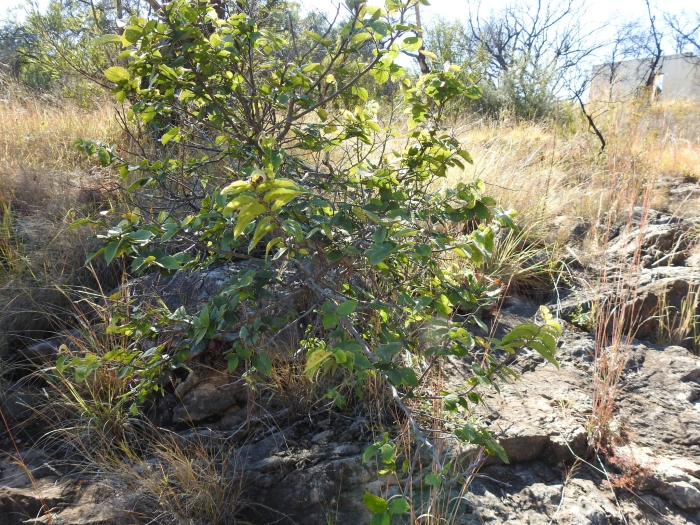White Stinkwood
(Celtis africana)
White Stinkwood (Celtis africana)
/
/

Matthew Fainman
CC BY 4.0
Image By:
Matthew Fainman
Recorded By:
Copyright:
CC BY 4.0
Copyright Notice:
Photo by: Matthew Fainman | License Type: CC BY 4.0 | License URL: http://creativecommons.org/licenses/by/4.0/ | Rights Holder: Matthew Fainman | Publisher: iNaturalist | Date Created: 2021-05-02T09:40:36-07:00 |











Estimated Native Range
Summary
Celtis africana, commonly known as White Stinkwood, is a deciduous tree native to a variety of habitats including riverine forests, forest margins, and savannahs in southern and eastern Africa. It can reach up to 82 feet (25 meters) in height in forested areas, while in more open habitats it often forms a dense, hemispherical canopy. The White Stinkwood is characterized by its pale grey bark, which becomes deeply furrowed with age. It produces inconspicuous pale yellow flowers in spring, followed by small, round, berry-like fruits that turn yellow when ripe and are favored by birds. The foliage is lush and green, providing a dense shade.
White Stinkwood is valued for its adaptability to different environments, making it a popular choice for urban planting, street trees, and bird-friendly gardens. It is also used for reforestation and erosion control due to its extensive root system. In cultivation, it prefers full sun to partial shade, and while it is drought-tolerant once established, it benefits from regular watering during prolonged dry periods. It thrives in well-drained soils and is relatively low-maintenance. Gardeners should be aware that the roots can be aggressive, potentially causing damage to nearby structures or pavements.CC BY-SA 4.0
White Stinkwood is valued for its adaptability to different environments, making it a popular choice for urban planting, street trees, and bird-friendly gardens. It is also used for reforestation and erosion control due to its extensive root system. In cultivation, it prefers full sun to partial shade, and while it is drought-tolerant once established, it benefits from regular watering during prolonged dry periods. It thrives in well-drained soils and is relatively low-maintenance. Gardeners should be aware that the roots can be aggressive, potentially causing damage to nearby structures or pavements.CC BY-SA 4.0
Plant Description
- Plant Type: Trees
- Height: 39-82 feet
- Width: 9.75-39 feet
- Growth Rate: Moderate
- Flower Color: N/A
- Flowering Season: Summer, Fall
- Leaf Retention: Deciduous
Growth Requirements
- Sun: Full Sun
- Water: Medium
- Drainage: Fast, Medium
Common Uses
Bird Garden, Low Maintenance
Natural Habitat
Riverine forests, forest margins, and savannahs in southern Africa
Other Names
Common Names: Common White Stinkwood , African Hackberry
Scientific Names: Celtis africana , Celtis burmannii , Celtis eriantha , Celtis eriantha , Celtis henriquezii , Celtis holtzii , Celtis kraussiana , Celtis kraussiana var. flavescens , Celtis kraussiana var. stolzii , Celtis opegrapha
GBIF Accepted Name: